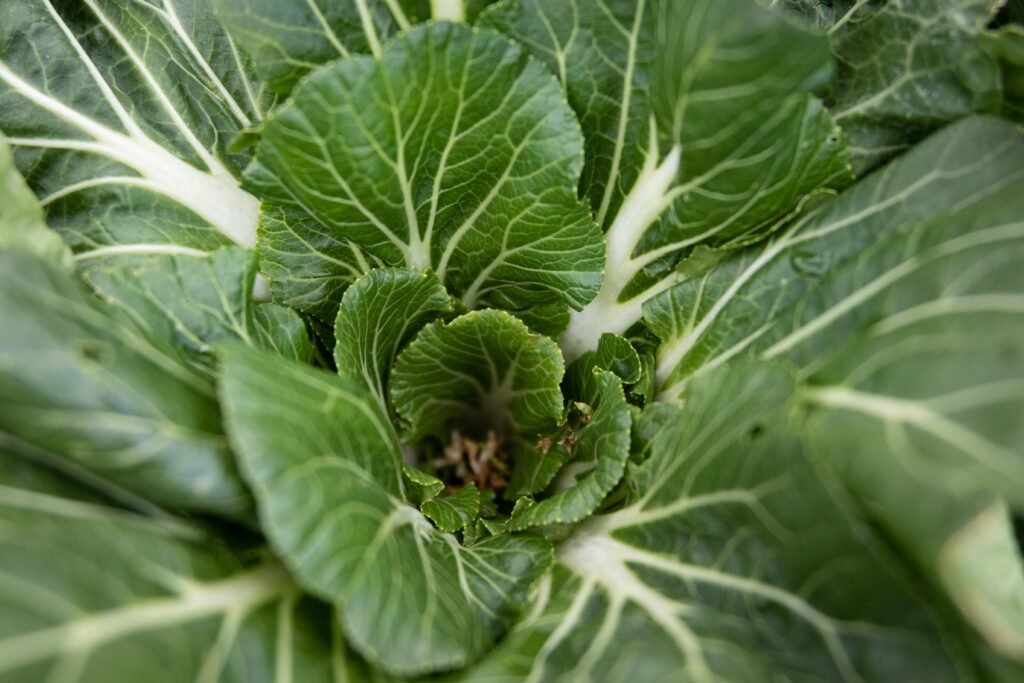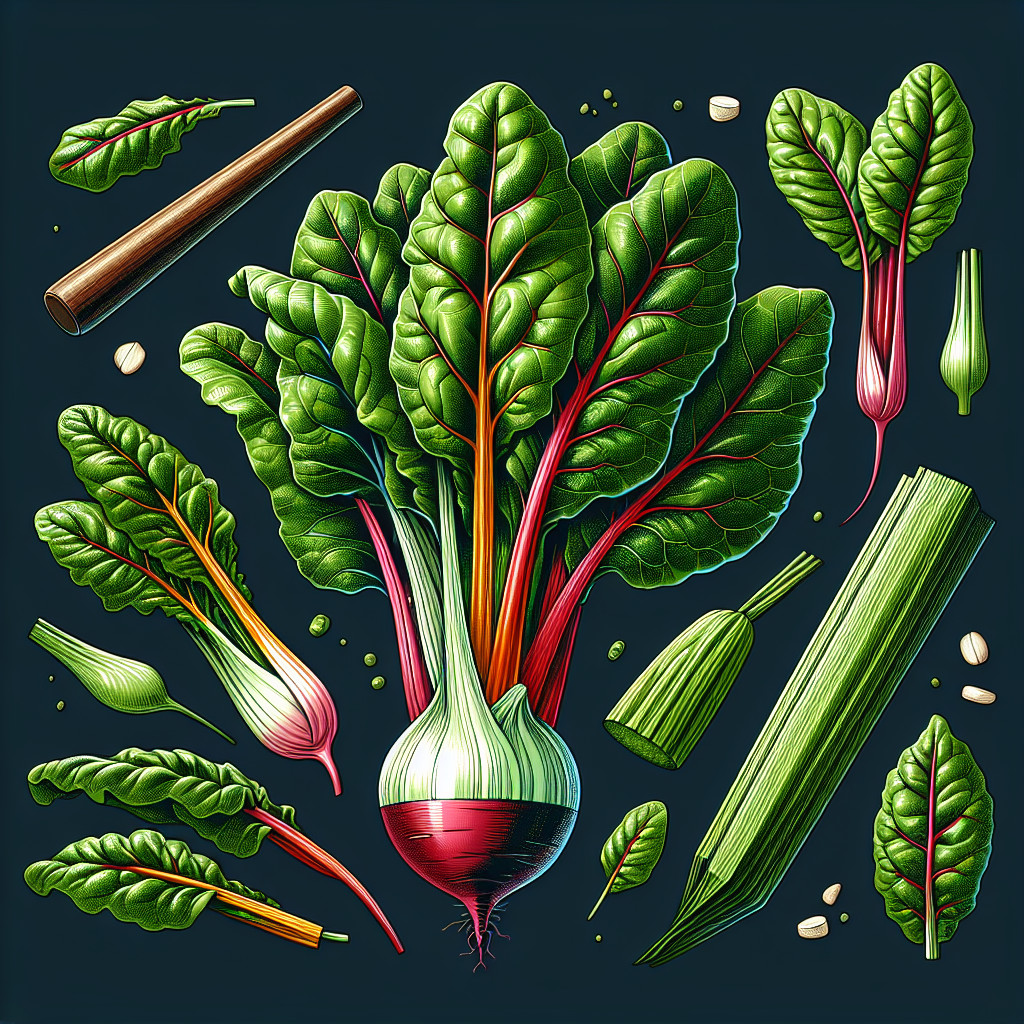Chard, also known as beet greens, is a leafy green vegetable that is packed with a multitude of benefits for your overall health and well-being. From improving digestion to boosting your immune system, chard provides a wide range of nutrients and antioxidants that can support various bodily functions. Whether you enjoy it steamed, sautéed, or added to a salad, incorporating chard into your diet can be a simple yet effective way to enhance your health and indulge in its vibrant flavors. So why not embrace the numerous benefits of chard and give your taste buds a delightful treat while nourishing your body?

Nutritional Value of Chard
Chard, also known as beet greens, is not only delicious but also packed with essential nutrients that contribute to your overall health and well-being. This leafy green vegetable is a powerhouse of vitamins and minerals, making it an excellent addition to your diet. Let’s explore the wonderful nutritional value of chard and how it can benefit your health.
Vitamins in Chard
Chard is a great source of vitamins, particularly vitamins A, C, and K. Vitamin A is essential for healthy vision, a strong immune system, and cell growth and development. Vitamin C is a powerful antioxidant that boosts your immune system, supports wound healing, and helps your body absorb iron. Vitamin K plays a crucial role in blood clotting, bone health, and preventing cardiovascular diseases. By incorporating chard into your meals, you can ensure you’re getting a healthy dose of these important vitamins.
Minerals in Chard
In addition to vitamins, chard is also rich in minerals that are vital for various bodily functions. It contains high levels of potassium, which helps maintain healthy blood pressure and regulate fluid balance. Chard is also a good source of magnesium, a mineral that supports nerve and muscle function, as well as bone health. Moreover, it contains calcium, iron, and manganese, which are essential for strong bones, oxygen transport, and energy production. Including chard in your diet is an easy way to boost your mineral intake and support overall health.
Health Benefits of Chard
Beyond its impressive nutritional profile, chard offers numerous health benefits that can positively impact your well-being. Let’s take a closer look at some of the key benefits that chard provides.
High in Antioxidants
Chard is rich in antioxidants, substances that help protect your cells from damage caused by harmful molecules called free radicals. These antioxidants, such as beta-carotene, lutein, and zeaxanthin, have been linked to a reduced risk of chronic diseases like heart disease, cancer, and age-related macular degeneration. By regularly consuming chard, you can increase your antioxidant intake and promote optimal health.
Promotes Heart Health
The nutrients found in chard, including potassium, magnesium, and fiber, contribute to heart health. Potassium helps regulate blood pressure and maintain steady heartbeat rhythms. Magnesium supports optimal muscle function, including the heart muscle, and helps prevent heart disease. Additionally, the fiber in chard helps reduce cholesterol levels, lower blood pressure, and decrease the risk of heart disease. By incorporating chard into your diet, you can take proactive steps towards a healthier heart.
Supports Bone Health
Chard is a valuable source of nutrients that promote strong and healthy bones. The combination of calcium, magnesium, and vitamin K found in chard is crucial for bone density and integrity. Calcium is essential for building and maintaining strong bones, while vitamin K aids in calcium absorption. Furthermore, magnesium contributes to bone health by regulating calcium levels and helping incorporate calcium into bone structure. Adding chard to your meals can effectively support bone health and reduce the risk of osteoporosis.

Digestive Health
A balanced and properly functioning digestive system is crucial for overall health and well-being. Chard can play a beneficial role in promoting digestive health, thanks to its fiber content.
Rich in Fiber
Chard is an excellent source of dietary fiber, which is essential for a healthy digestive system. Fiber adds bulk to your stool, making it easier to pass, and helps prevent constipation. It also promotes the growth of beneficial gut bacteria and supports a healthy gut microbiome. Including chard in your diet can increase your fiber intake and keep your digestive system running smoothly.
Promotes Regular Bowel Movements
Due to its high fiber content, chard can help promote regular bowel movements. Fiber adds bulk to your stool, increasing its weight and softness, which stimulates the muscles in your intestines and encourages regular bowel movements. Regular consumption of chard can help prevent issues such as constipation, bloating, and discomfort, allowing your digestive system to function optimally.
Weight Management
Maintaining a healthy weight is important for overall health and reducing the risk of chronic diseases. The low-calorie nature of chard, combined with its fiber content, makes it a valuable addition to a weight management plan.
Low in Calories
Chard is a low-calorie vegetable, making it an ideal choice for those aiming to lose or maintain weight. It provides essential nutrients and fills you up without adding excessive calories to your diet. By incorporating chard into your meals, you can enjoy a satisfying and nutritious option that supports your weight management goals.
Promotes Satiety and Reduces Cravings
The fiber content in chard can help keep you feeling full and satisfied, preventing overeating or unnecessary snacking between meals. Fiber takes longer to digest, slowing down the rate at which your stomach empties and keeping you feeling fuller for longer. Additionally, chard contains a range of vitamins and minerals that can help reduce cravings for unhealthy snacks. Including chard in your meals can support your weight management efforts by promoting satiety and reducing cravings.

Blood Sugar Control
Maintaining stable blood sugar levels is essential for overall health, especially for individuals with diabetes or insulin resistance. Chard can play a beneficial role in blood sugar control due to its low glycemic index and its ability to regulate insulin response.
Low Glycemic Index
The glycemic index (GI) measures how quickly carbohydrates are digested and absorbed, causing a rise in blood sugar levels. Foods with a low GI are digested more slowly, resulting in a gradual and steady release of glucose into the bloodstream. Chard has a low GI, making it a suitable choice for individuals looking to control their blood sugar levels. It can help prevent rapid spikes and drops in blood sugar, providing a more stable and balanced energy supply.
Regulates Insulin Response
Insulin is a hormone that plays a crucial role in regulating blood sugar levels. Chard contains nutrients that can support proper insulin function and help regulate insulin response. By promoting insulin sensitivity and reducing insulin resistance, consuming chard can contribute to better blood sugar control. Including chard in your diet can be an effective strategy for managing blood sugar levels, especially for individuals with diabetes or at risk of developing it.
Eye Health
Taking care of your eyes is essential for maintaining good vision and preventing age-related eye diseases. Chard contains nutrients that are particularly beneficial for eye health.
Contains Lutein and Zeaxanthin
Chard is rich in lutein and zeaxanthin, two carotenoids that are important for eye health. These compounds act as antioxidants in the eyes, protecting them from damage caused by free radicals. Lutein and zeaxanthin are also believed to filter harmful blue light and reduce the risk of age-related macular degeneration, a leading cause of vision loss in older adults. By incorporating chard into your diet, you can nourish your eyes and promote long-term eye health.
Protects against Age-related Macular Degeneration
Age-related macular degeneration (AMD) is a condition characterized by the progressive loss of central vision and can significantly impact daily life. The high levels of lutein and zeaxanthin found in chard can help protect against AMD and reduce the risk of developing this age-related eye disease. Consuming chard regularly may contribute to preserving your vision and maintaining eye health as you age.

Boosts Immune System
A strong immune system is paramount in defending your body against illnesses and infections. Chard contains nutrients that can boost your immune system and help keep you healthy.
Rich in Vitamin C
Chard is an excellent source of vitamin C, a powerful antioxidant that strengthens the immune system and fights off harmful pathogens. Vitamin C stimulates the production of white blood cells, which are vital in protecting the body against infections. By consuming chard, you can increase your vitamin C intake and give your immune system a natural boost.
Enhances Immune Function
Chard contains various nutrients, including vitamins A and K, iron, and manganese, that play a role in enhancing immune function. These nutrients support the production of immune cells, help regulate immune responses, and contribute to overall immune system health. Regularly incorporating chard into your diet can fortify your immune system and help protect you from common illnesses.
Detoxification
Supporting the natural detoxification processes of your body is essential for optimal health. Chard can aid in detoxification thanks to its chlorophyll-rich composition.
Chlorophyll-rich
Chard owes its vibrant green color to chlorophyll, a pigment that plays a crucial role in photosynthesis. Chlorophyll has been linked to various health benefits, including detoxification. It can help neutralize and eliminate toxins, heavy metals, and harmful chemicals from your body. By consuming chard, you provide your body with beneficial chlorophyll, supporting its natural detoxification processes and promoting overall wellness.
Supports Liver Function
The liver is responsible for detoxifying harmful substances and filtering them out of the body. Chard contains nutrients, such as vitamins A and C, that support liver function and enhance its detoxification capacity. By promoting liver health, chard can aid in the elimination of toxins and contribute to a cleaner, healthier body.

Improves Cognitive Function
Maintaining optimal cognitive function is important for your overall well-being and quality of life. Chard contains nutrients that can help improve cognitive function and protect against age-related cognitive decline.
Rich in Brain-Boosting Nutrients
Chard is a rich source of brain-boosting nutrients, such as vitamins A, C, and K, as well as magnesium. These nutrients are essential for proper brain development and function. Vitamin A supports memory and learning, while vitamin C is involved in the production of neurotransmitters, chemicals that transmit signals in the brain. Vitamin K is believed to protect against cognitive decline. Moreover, magnesium plays a role in neurotransmitter production and promotes brain health. By regularly consuming chard, you can nourish your brain and support cognitive function.
Protects against Age-related Brain Decline
Age-related cognitive decline, such as memory loss and decreased cognitive function, is a common concern as we get older. The nutrients found in chard, particularly vitamins C and K, have been associated with a reduced risk of cognitive decline and neurodegenerative diseases like Alzheimer’s. Additionally, the antioxidants in chard protect brain cells from oxidative stress, which can contribute to brain aging. Including chard in your diet can help protect your brain as you age and improve cognitive function.
Skin Health
Maintaining healthy and youthful-looking skin is something many of us strive for. Chard contains nutrients that can benefit your skin health and protect against signs of aging.
Promotes Collagen Production
Collagen is a protein that provides structure and elasticity to your skin. Chard is rich in nutrients, such as vitamins A and C, that support collagen production. Vitamin A aids in skin cell growth and repair, while vitamin C is crucial for collagen synthesis. Consuming chard can help promote collagen production, improve skin elasticity, and contribute to a healthier complexion.
Protects against Skin Aging
The antioxidants found in chard, including vitamins A and C, help protect your skin from damage caused by free radicals. Free radicals can accelerate skin aging, leading to wrinkles, fine lines, and dullness. By consuming chard regularly, you can increase your antioxidant intake and protect your skin from premature aging. Additionally, the chlorophyll in chard can help detoxify your skin, promoting a clearer and more radiant complexion.
In conclusion, chard, or beet greens, is a nutritional powerhouse that offers a wide array of health benefits. From providing essential vitamins and minerals to supporting heart health, bone health, and digestive health, chard is a valuable addition to any diet. Its low-calorie nature, high fiber content, and ability to regulate blood sugar levels make it a beneficial food for weight management and controlling cravings. The antioxidants in chard protect against chronic diseases, including age-related eye diseases and cognitive decline. Furthermore, chard supports immune function, aids in detoxification, and promotes healthy skin. By incorporating chard into your meals, you can nourish your body, protect your health, and enjoy a delicious and versatile vegetable.

